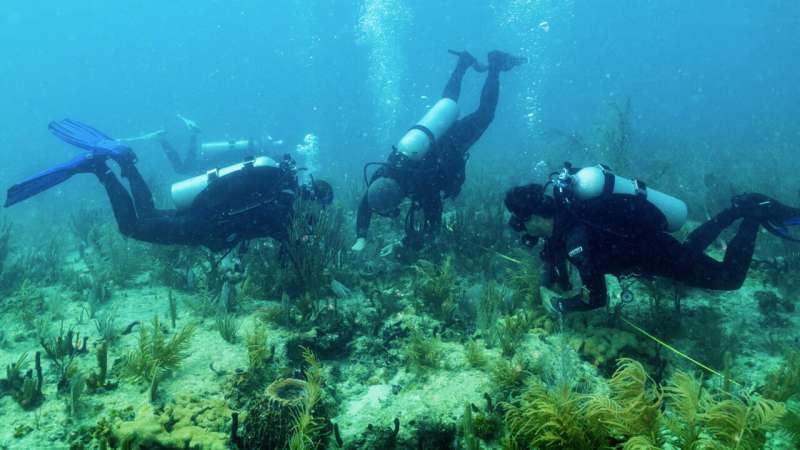
A collaborative effort among scientists from the University of Miami Rosenstiel School of Marine, Atmospheric, and Earth Science, Tela Marine, and The Florida Aquarium has led to a significant advancement in coral restoration. Researchers have successfully outplanted elkhorn corals onto a Miami reef, produced by crossbreeding elkhorn parents from Florida with those from a uniquely warm reef in Tela Bay, Honduras. This initiative aims to bolster the genetic diversity of Florida’s remaining elkhorn coral gene pool while potentially enhancing their heat tolerance and resilience.
Andrew Baker, a professor of marine biology and ecology at the Rosenstiel School and director of the Coral Reef Futures Lab, emphasized the critical role of elkhorn coral (Acropora palmata) in Caribbean ecosystems. “Elkhorn coral is a critically endangered species and one of the most important reef-building corals in the Caribbean,” he stated. “Its large, branching structure creates vital habitat for marine life, helps reefs grow, and acts as a natural barrier protecting coastlines from storms.”
The plight of elkhorn coral has become urgent, with populations declining by over 99% since the 1980s due to diseases, warming oceans, and other stressors. This decline has made the species a focal point for coral restoration efforts.
In June 2024, Baker led a research team to Tela Bay, where they conducted genetic sampling and collected spawning-sized fragments of resilient corals. Tela Bay’s reefs manage to survive despite facing unusually warm water temperatures, low visibility, and runoff from agriculture—conditions that typically devastate coral ecosystems elsewhere. The research team collected hundreds of DNA samples from ten coral species to investigate genetic traits that contribute to heat resilience.
They also transported 13 elkhorn coral fragments to Miami, aiming to crossbreed them with local colonies. Shortly after their arrival, seven of these Honduran elkhorn coral colonies were taken to The Florida Aquarium’s Coral Conservation and Research Center in Apollo Beach, Florida. This facility is the first in the world to successfully induce elkhorn coral to spawn in a laboratory setting.
In July 2024, the colonies successfully spawned alongside Florida’s elkhorn corals, resulting in over 200 Flonduran coral babies. Keri O’Neil, senior scientist and director of the Coral Conservation Program at The Florida Aquarium, noted, “After nearly a year of careful care, the first 35 Flonduran babies and 35 Florida elkhorn coral babies have returned to the ocean off Miami to help rebuild and strengthen future reefs. We’re hopeful these babies will lead to stronger, more resilient coral populations across the Caribbean.”
Baker remarked on the international collaboration, stating, “Corals don’t know international boundaries. By working together across borders, we’re helping these critical reef-builders strengthen the entire Caribbean population.” This outplanting serves as a pilot project to assess how the new corals fare as water temperatures rise, providing valuable insights for future coral restoration efforts.
The partnership underscores the importance of scientific and regulatory collaborations that cross national borders to preserve biodiversity. By merging genetic material from resilient coral populations, the initiative aims not only to restore the structural integrity of reefs but also to enhance their ecological functions throughout the Caribbean.
“The successful spawning and outplanting of Flonduran coral babies underscore the importance of combining innovation with international cooperation in combating the increasing threats faced by coral ecosystems,” Baker added.
Antal Borcsok, CEO and co-founder of Tela Marine, emphasized the significance of this research. “Tela Bay’s reefs have shown us that corals can survive and even thrive in challenging, warm-water environments. By sharing this resilience and collaborating across borders, we are giving elkhorn coral a better chance not just in Honduras, but across the Caribbean.”
Experts believe that restoring Florida’s elkhorn coral requires a coordinated genetic-rescue effort, similar to the successful recovery of the Florida panther. Mike Tringali, senior research scientist at the Florida Fish and Wildlife Conservation Commission, stated, “The benefits outweigh the genetic risks.”
Jennifer Koss, director of the NOAA Coral Reef Conservation Program, expressed pride in supporting this work. “This effort stems from a National Academies study we commissioned on coral interventions, and we’re excited to see how quickly these innovations are being put into action.”
The parent colonies at The Florida Aquarium and the Rosenstiel School continue to thrive, ensuring the capability to produce more Flonduran babies in future spawning seasons. This ongoing effort aims to rebuild and strengthen coral reefs across the Caribbean for years to come.







